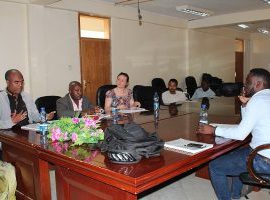The Africa Center of Excellence for Climate Smart Agriculture and Biodiversity Conservation (ACE Climate SABC), one of the four Centers of Excellence established in Ethiopia with the competitive grant loans obtained from the World Bank (WB) tw0 years ago at Haramaya University, held an open defense examination for its first cohort Masters students during the period of February 7-8, 2020 at the Resource Center of the University.
These students were examined by Board of Examiners established by the Graduate Council of the Center from among faculty members of the University and scholars working in different national, regional and international institutions/organizations to serve as external examiners, internal examiners and chairpersons of the Board. While the external examiners must come from outside the University, the internal examiners and the chairpersons were mostly faculty members of the Haramaya University. The external examiners are invited from institutions/organizations within the country or outside the country. Defense exercises were conducted with such professional mix that would massively contribute to the Center’s effort of ensuring the quality of its theses research activities in particular and its postgraduate teaching in general.
In view of Dr. Mulugeta Damie, Project Manager of ACE Climate SABC, this Master’s Thesis open Defense Examination is one of the major activities put up on the annual plan of the Center for this budget year and students that defended their theses, Center’s staff and stakeholders would deserve a round of applause for the wonderful jobs they have done. Dr. Tesfaye Lemma, the Research and Training Head of the Center, on his part, said such activities would serve primarily as a quality check on the theses produced by students of the Center as the Board of Examiners critical see whether the theses meet international standards.
This time round, 19 students of the Center have successfully defended their theses of which 11 are females and the remaining eight are males. Region wise, 12 of them are Ethiopian nationals while two are Kenyans, two are Ugandans, another two are Malawians and one is a Zimbabwean. The Center is so grateful to the World Bank, its project team, affiliated faculty from College of Agriculture and Environmental Sciences and the University officials for their contributions towards this remarkable target.
